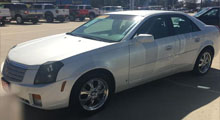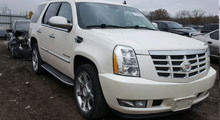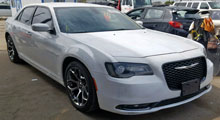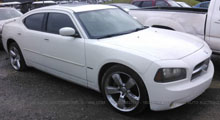Are Repo Cars Safe?
Buying a repossessed car can offer great value for money, with some people saving thousands of dollars off the list price for their vehicle. Sound too good to be true? Let’s take a look at why repossessed cars are typically so much cheaper, what you need to look out for and what to do if you have any safety concerns.
Why are Repossessed Cars Sold for Less than their Market Value?
Cars are repossessed when their registered owners default on their finance payments. Finance companies make money through interest on loans and so it’s preferential for them to try to work with the owner and find a solution allowing them to continue to pay. This isn’t always possible and different companies vary in the amount of time and leeway they may offer their client. Once the car is repossessed, it becomes an asset of the lender who then sells to recoup their losses.
You have probably heard stories about disgruntled owners destroying their vehicles prior to a repossession. Like many things in life, the extreme cases often get greater attention. Also, like everything else, nothing is ever risk free, and in purchasing a repossessed car, it is the element of risk that allows for a greater reduction in price. That, and the fact that once the lenders gain possession of the vehicle they are simply looking to quickly sell it on. Their business is finance, not used car salesmanship. It is essentially this point that allows the buyer to make huge savings on a repossessed car.
The element of risk can be greater when purchasing a repossessed vehicle, hence the possible savings. However, this doesn’t necessarily make them any less safe than buying a used car, provided you exercise caution, do your research and know when not to buy. Buying a car without a warranty and that has been taken away from a possibly bitter ex-owner certainly doesn’t inspire confidence, but the repossessed car trade is huge and there are plenty of bargains to be made.
Do Your Homework
So, buying a repossessed car will mean taking a risk. Nothing ventured, nothing gained, as the saying goes. However, by planning and researching, knowing your limits and getting help when needed, you can minimize any risks and still make great savings.
Before considering making a purchase you should find out the list price from the NADA (National Automobile Dealers Association) of any vehicles you’re interested in and set yourself limits. If the price looks too good to be true, then it probably is. Take into account any information you can get on the vehicle and if you don’t know much about cars, arrange to be accompanied by someone who does. Any purchase can go wrong, but by getting a knowledgeable person to thoroughly inspect the vehicle first you’re likely to avoid a lot of potential problems.
Another pitfall to avoid is becoming too excited about one particular vehicle, or feeling the need to purchase something, anything. You need to be keep your cool, if you get too excited about a particular car you risk turning a blind eye to certain faults it may have or paying more than it’s worth. Objective thinking is a must. If there’s nothing that’s really for you that day it’s important to know when to walk away, there will be plenty of other opportunities. If you think you have found what you’re looking for, take the time to make a thorough inspection. Once again, prepare to walk away if you’re not happy with any aspect of the vehicle and pay particular attention that all of the paperwork is correct and present. It’s not a failure going home empty handed.
Auction, Banks or Repo Resellers?
Is it safer to purchase your repossessed vehicle directly from the lender, at auction or through a repo reseller? There is no safer way to purchase a repossessed car, it is however, recommended that you broaden your search before narrowing down the individual vehicles to a handful that are right for your circumstances and budget. Some auctions are dealers only, so you may find that if you can get a list of available repossessions for sale directly from a lender you may have access to potentially better deals.
In order to make the purchase that is right for you, you also need to consider what makes you the most comfortable. Buying at auction is not for everyone and it can be easy to get carried away by the pressure. If this isn’t for you, try contacting local lenders to see if you can get a copy of their vehicles and research carefully before making an offer. There may not be much information to go on, or even any way to get any specifics. Make sure you are confident and thoroughly inspect the vehicle before making your final offer or take a competent person with you for a second opinion.
Repo resellers are also a popular option. Although adding an extra company to the process means higher costs, repo resellers don’t transfer the car to themselves and act as intermediaries. They are useful as they allow potential purchasers a chance to find out more about the vehicles while contemplating making an offer. They usually offer a number of high quality photographs and in-depth details on condition and they may even clean up vehicles, remove previous owner's personal items and so on. Working on a low profit, high turnover model, this can be an inexpensive way to get a chance to make a more confident buy as you will have extra details to be able to research vehicles more thoroughly and at your leisure. Once again, it is recommended to take a knowledgeable person with you to thoroughly inspect the vehicle before making a final offer. Do not under any circumstances send any payments before seeing the vehicle and signing, and make sure all necessary documentation is complete and correct.
Are Repo Cars Safe to Buy?
Buying a repossessed car can be a gamble. However, it doesn’t have to be much more so than buying an average used car. The level of risk really depends upon the buyer, their level of knowledge, their personality and amount of research they are willing to put into a purchase. While a repossessed car won’t come with a warranty, the amount of money you could save can certainly make it worthwhile.
In short, if you are prepared, know yourself and your limits, you can safely purchase a repossessed car and save yourself a lot of money. This is simply because the cars are sold undervalue for a quick sale. Of course, there will be repossessed cars out there that are far from what you’re looking for, while some people might want one to drive away, others will be looking for one to repair and add value, some may wish to take huge risks, while others are looking to play it safe. The question is not really whether or not repossessed cars themselves are safe, it’s whether or not the buyer has the confidence and knowledge, or assistance, to make a sensible purchase. In this respect purchasing a repossessed car is no less secure than purchasing any other second-hand vehicle. While people often like to show off about how much they have spent, when they’ve made a great bargain and got a decent car for much less, they tend to it keep quiet.





